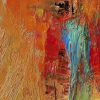 Eric Jarosinski is a highly distinguished #FailedIntellectual based in New York. A former professor of modern German literature, culture, and critical theory, he recently left academia to devote himself to his post as founding editor of Nein. Quarterly, the Internet’s leading compendium of utopian negation. On Twitter @NeinQuarterly has gained a highly diverse global audience, currently numbering over 100,000 readers in more than 125 countries. Nein. Quarterly also appears in a four-line print format, with its trademark scowl gracing the opinion page of Die Zeit in Germany. His first book, Nein. A Manifesto., was published in 2015 in the US (Grove Atlantic).
Eric Jarosinski is a highly distinguished #FailedIntellectual based in New York. A former professor of modern German literature, culture, and critical theory, he recently left academia to devote himself to his post as founding editor of Nein. Quarterly, the Internet’s leading compendium of utopian negation. On Twitter @NeinQuarterly has gained a highly diverse global audience, currently numbering over 100,000 readers in more than 125 countries. Nein. Quarterly also appears in a four-line print format, with its trademark scowl gracing the opinion page of Die Zeit in Germany. His first book, Nein. A Manifesto., was published in 2015 in the US (Grove Atlantic).
How did you become interested in German studies?
I’d like to say it was because of Kafka or Brecht, but it was largely chance. A classmate at my small-town Wisconsin high school spent a year in Germany and got me interested in it once she was back. I ended up studying German and journalism, and though I never expected it, I suppose what I do now brings those fields together relatively well.
Don’t worry. Somewhere Bertolt Brecht is quietly noting your ironic detachment. And feeling for you.
— Nein. (@NeinQuarterly) May 6, 2017
How did receiving an IDRF award impact your graduate education? Has it had an impact on @NeinQuarterly?
I was in an excellent graduate program, but also one without much funding. Without the IDRF, I don’t know if I could have finished my dissertation research in Berlin. It certainly impacted Nein in that much of my material comes from aspects of daily life in Germany that I never would have known unless I’d spent enough time immersed in the language and culture.
A gentle reminder about German humor. It often gets lost in translation. Into German.
— Nein. (@NeinQuarterly) April 25, 2017
Is there any advice you wish you had gotten in graduate school?
No, I actually got the very best advice on my very first day in the program: “If you’re here to get a job, go home.” That came from an emeritus professor who was gravely concerned about the future of German studies in the US and felt a responsibility to be honest with the new recruits. Not the most inspiring words perhaps, but I was always grateful, because awareness of dismal job prospects led me to continually ask myself why my studies mattered to me on more than just a professional level.
What advice would you give to the incoming 2017 IDRF cohort?
Uhm… “If you’re going there to get a job, stay home.”
Sorry, recent graduate. Your alma doesn’t mater.
— Nein. (@NeinQuarterly) May 17, 2017
Why did you decide to leave academia and how have you managed to carve out a niche for yourself outside of that world?

Well, more or less, I let my failure to finish the book I needed to publish for tenure make the decision for me. In general, I realized that I am more cut out to be a teacher than a researcher, something it’s wiser to know about oneself before taking a job at a research university. Since leaving academia, I don’t know if I’ve really made a place for myself just yet. My career is still quite precarious and experimental. Traveling Twitter Aphorist isn’t widely recognized as a profession, nor is it easy to sustain financially.
How did you cultivate your social media aesthetic?
Trial and error, I suppose. Also: addiction. In the early days it was not uncommon for me to spend ten or more hours per day on Twitter. In the meantime, I’ve established a healthy distance from the medium.
Are there other scholars whose social media you follow?
Very few. Strangely, I find that some of the smartest people write the worst tweets.
I saw the best drafts of my generation. Destroyed. By hitting Tweet.
— Nein. (@NeinQuarterly) June 3, 2017
How have you maintained a balance between your scholarly research and other projects?
Right now the balance I’m seeking is more between being on the road or being at home, following the news online or reading books.
What is the last article/book/news you heard or read that is exciting to you?
The best thing about leaving academia has been that I’ve come to really enjoy reading again. Recent novels I’ve really liked were Don DeLillo’s Zero K, Sibylle Berg’s Vielen Dank für das Leben, and Christian Kracht’s Die Toten. Recently, I’ve also been making my way through all of Theodor W. Adorno’s published lectures, something I had put off for years. You get a very different sense of him as a person reading these. He has more of a sense of humor than I’d expected, and his work in the lecture hall has shown me he was a gifted teacher.
Summer without a reading list. Like tragedy without farce.
— Nein. (@NeinQuarterly) May 19, 2017
@NeinQuarterly has nearly 150K followers on Twitter. What does it feel like to have this kind of platform? What are you excited about working on now?
I’m happy to have found an audience, since that’s opened some doors, but I also miss the days when there was a much smaller, tight-knit community surrounding Nein. What I’ve been most excited about recently has been turning my work on Twitter into a live performance. The result is a combination of lecture and stand-up, I suppose, philosophy and current events. It’s much harder than Twitter, but ultimately far more rewarding.
Break your heart. Sell your soul. And ruin your day. All in under 10 minutes. The @NeinMinutes podcast. Starting soon.
— Nein. (@NeinQuarterly) April 14, 2017













